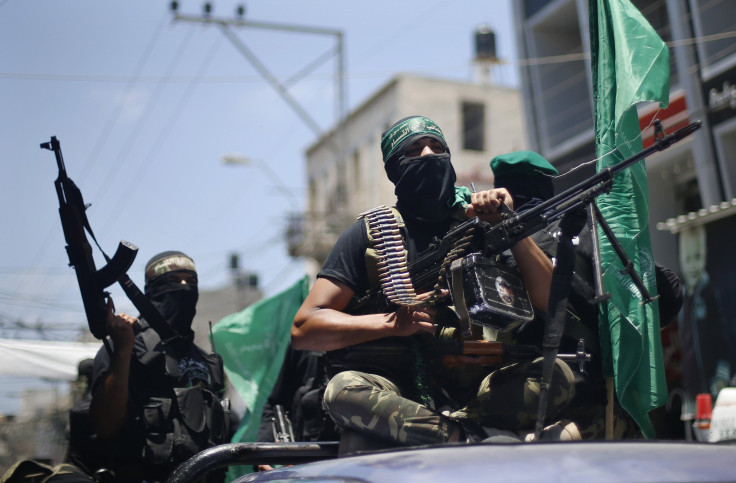What Is The Difference Between ISIS And Hamas?

Update as of 11:57 a.m. EDT: This story has been updated to include a reference to the Hamas charter which calls for the death of Jews.
Two terrorist organizations have been thrust into the media limelight this summer: Hamas and the Islamic State of Iraq and Syria, which now calls itself simply Islamic State. President Barack Obama used the word “barbaric” to describe both groups on two separate occasions this week.
On the first occasion, the president made his fiercest condemnation of Hamas since the beginning of “Operation Protective Edge,” accusing the government of Gaza of violating a cease-fire and capturing an Israeli soldier. On the second occasion, he made reference to Islamic State's stated desire to eliminate the Yazidi people, a minority group in Iraq, from the planet.
The United States considers both Islamist militant groups to be terrorist organizations. As of Friday, both were undergoing targeted air strikes for threatening the national security of countries that had previously (or currently) occupied their territory (Hamas in Gaza, at Israel's hand; Islamic State in Iraq, under U.S. assault). The two have also played a role in their respective countries' ongoing humanitarian crisis and both want the elimination of an entire portion of humanity. But there are major differences.
Hamas is actually an elected government.
Hamas is one of the two major political parties of Gaza, its counterpart being Fatah, currently the leader of the Palestinian Authority. In 2006, Hamas won the Palestinian legislative election, despite the U.S. having deemed it a terrorist organization in 1997. A year later, Fatah leaders led a coup against Hamas and effectively split Palestine between the West Bank and Gaza.
Islamic State, on the other hand, was born from the remains of a U.S.-led invasion of Iraq to oust Saddam Hussein and was nurtured into its current homicidal sociopathic-teenager stage by a mixed bag of jihadist groups that made Syria their home during the civil war. The U.S. declared ISIS a terrorist organization in 2004.
Hamas finds allies in other foreign governments; Islamic State has very few friends in political power.
The governments in Qatar, Turkey and Iran have all shared a special relationship with Hamas, which had been responsible for a large sum of their funding. From 2012 to 2013 their ideological and political founding fathers the Muslim Brotherhood in Egypt were also a government ally when Mohammed Morsi was elected president of Egypt.
While in a much better spot financially than Hamas, Islamic State has no government support. The bulk of its money comes from private backers, extortion, smuggling and other types of crime, according to the Council on Foreign Relations.
Islamic State wants to create a caliphate, Hamas wants to end what it calls the siege of the Gaza Strip.
Hamas’ main demand in cease-fire negotiations is to end the occupation of the Gaza Strip. Its charter seeks to eliminate the state of Israel and take back the land of Palestine, though Hamas has no stated plan to invade other places and impose its regime.
The same cannot be said for Islamic State, whose major plan is to unite the borders of Iraq and the Levant and create an Islamic Caliphate that would operate under Sharia law. Currently, the Levant refers to Syria, Palestine, Lebanon, Israel, Jordan, Cyprus and parts of Turkey.
Islamic State also has its sights set on the U.S. Back before it was known as ISIS, when it was still known as al-Qaeda in Iraq (AQI), its leader developed a strategy for eliminating coalition forces in Iraq. According to the Council on Foreign Relations, they were: “Isolate U.S. forces by targeting its allies; discourage Iraqi collaboration by targeting government infrastructure and personnel; target reconstruction efforts through high-profile attacks on civilian contractors and aid workers; and draw the U.S. military into a Sunni-Shiite civil war by targeting Shiites.” On Friday, Islamic State vowed to get revenge on the U.S. newest round of airstrikes in Iraq that target the insurgent group, by calling for global sleeper cell attacks.
They actually agree on one major point: Both groups want to eliminate an entire group of people
In addition to engaging in ongoing conflict with Shiite Muslims, Islamic State has seized several towns in Iraq, forcing thousands of religious minorities to flee their homes after the group announced it would eliminate the entire Yazidi religious minority in the northern Iraq town of Sinjar and seized the largest Christian town of Qaraqosh. In a recent press briefing on Iraq, President Obama said, "[Islamic State] forces have called for the systematic destruction of the entire Yazidi people, which would constitute genocide."
The Hamas charter says, “The Islamic Resistance Movement [Hamas] aspires to the realization of Allah’s promise, no matter how long that should take. The Prophet, Allah bless him and grant him salvation, has said: ‘The day of judgment will not come until Muslims fight the Jews (killing the Jews), when the Jews will hide behind stones and trees. The stones and trees will say ‘O Muslims, O Abdulla, there is a Jew behind me, come and kill him.” This is as much as a call for genocide as the Islamic State's systematic killing off of the Yazidi people.
© Copyright IBTimes 2024. All rights reserved.












